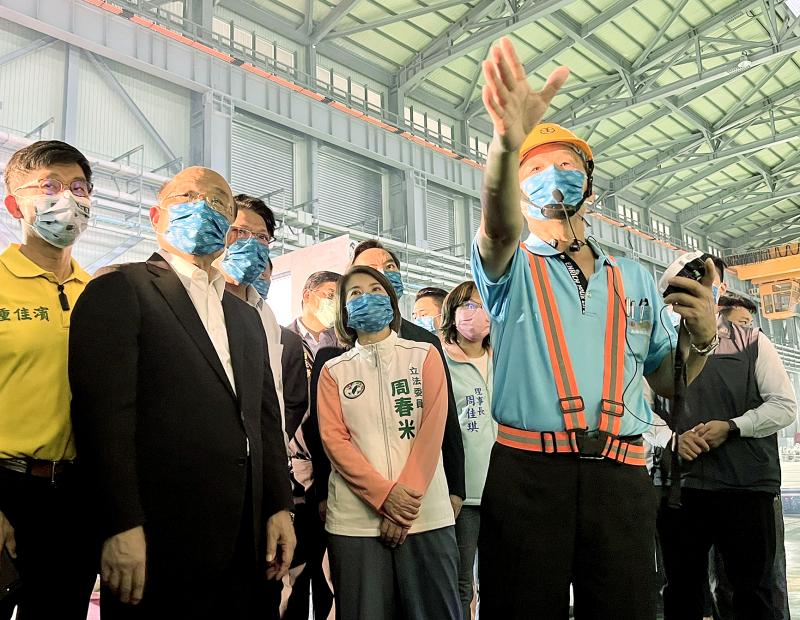The name of a train depot in Pingtung County should be changed to highlight that the Taiwan Railways Administration’s (TRA) western main line begins there, Premier Su Tseng-chang (蘇貞昌) said yesterday at the site’s opening ceremony.
At the new Kaohsiung Railway Workshop Depot, which was relocated to Pingtung’s Chaojhou Township (潮州), only 18 workers are needed to service a train within just 40 minutes, Su said.
At the old depot, 156 employees worked 12-hour shifts, he added.

Photo: CNA
Streamlined train maintenance work improves service at the agency, which transports about 200 million passengers a year, Su said.
The TRA said in a news release that the depot was moved to Chaojhou at a cost NT$134.8 billion (US$4.54 billion) because the Kaohsiung City Government is planning to move all railways in the city underground.
The new depot has the TRA’s largest repair capability, and is the most technologically advanced and environmentally friendly of all its depots, Su said.
Its material management information system enables standardized, digitized repairs of tourism and normal trains, Su said.
The TRA is planning to set up a railway culture park around the depot’s retention pond, hoping that the depot would also serve as a tourist site.
Su said he hopes the depot would be a boon for Pingtung’s tourism sector.
The planned corporatization of the TRA would also help create jobs in the area, Su said, thanking the agency’s employees who support the planned reform.
“The move will bring back the glory days of the TRA and once again make its employees proud to be working for the organization,” Su said.
Pingtung County Commissioner Pan Men-an (潘孟安) said the depot’s railway culture park would hopefully attract tourists to the area, where they can also visit the Chao Hao Wan Playground (潮好玩幸福村).

Alain Robert, known as the "French Spider-Man," praised Alex Honnold as exceptionally well-prepared after the US climber completed a free solo ascent of Taipei 101 yesterday. Robert said Honnold's ascent of the 508m-tall skyscraper in just more than one-and-a-half hours without using safety ropes or equipment was a remarkable achievement. "This is my life," he said in an interview conducted in French, adding that he liked the feeling of being "on the edge of danger." The 63-year-old Frenchman climbed Taipei 101 using ropes in December 2004, taking about four hours to reach the top. On a one-to-10 scale of difficulty, Robert said Taipei 101

A preclearance service to facilitate entry for people traveling to select airports in Japan would be available from Thursday next week to Feb. 25 at Taiwan Taoyuan International Airport, Taoyuan International Airport Corp (TIAC) said on Tuesday. The service was first made available to Taiwanese travelers throughout the winter vacation of 2024 and during the Lunar New Year holiday. In addition to flights to the Japanese cities of Hakodate, Asahikawa, Akita, Sendai, Niigata, Okayama, Takamatsu, Kumamoto and Kagoshima, the service would be available to travelers to Kobe and Oita. The service can be accessed by passengers of 15 flight routes operated by

Taiwanese and US defense groups are collaborating to introduce deployable, semi-autonomous manufacturing systems for drones and components in a boost to the nation’s supply chain resilience. Taiwan’s G-Tech Optroelectronics Corp subsidiary GTOC and the US’ Aerkomm Inc on Friday announced an agreement with fellow US-based Firestorm Lab to adopt the latter’s xCell, a technology featuring 3D printers fitted in 6.1m container units. The systems enable aerial platforms and parts to be produced in high volumes from dispersed nodes capable of rapid redeployment, to minimize the risk of enemy strikes and to meet field requirements, they said. Firestorm chief technology officer Ian Muceus said

MORE FALL: An investigation into one of Xi’s key cronies, part of a broader ‘anti-corruption’ drive, indicates that he might have a deep distrust in the military, an expert said China’s latest military purge underscores systemic risks in its shift from collective leadership to sole rule under Chinese President Xi Jinping (習近平), and could disrupt its chain of command and military capabilities, a national security official said yesterday. If decisionmaking within the Chinese Communist Party has become “irrational” under one-man rule, the Taiwan Strait and the regional situation must be approached with extreme caution, given unforeseen risks, they added. The anonymous official made the remarks as China’s Central Military Commission Vice Chairman Zhang Youxia (張又俠) and Joint Staff Department Chief of Staff Liu Zhenli (劉振立) were reportedly being investigated for suspected “serious